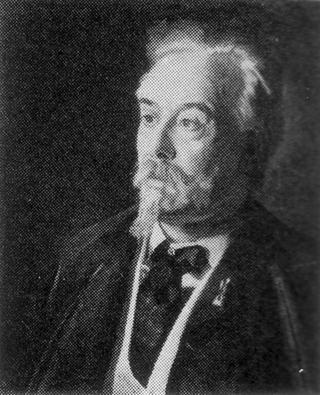
Pterodactylus is a genus of extinct pterosaurs. It is thought to contain only a single species, Pterodactylus antiquus, which was the first pterosaur to be named and identified as a flying reptile and one of the first prehistoric reptiles to ever be discovered.
Bernardus Silvestris, also known as Bernard Silvestris and Bernard Silvester, was a medieval Platonist philosopher and poet of the 12th century.
Bernard of Chartres was a twelfth-century French Neo-Platonist philosopher, scholar, and administrator.

Niccolò dell'Abbate, sometimes Nicolò and Abate was a Mannerist Italian painter in fresco and oils. He was of the Emilian school, and was part of the team of artists called the School of Fontainebleau that introduced the Italian Renaissance to France. He may be found indexed under either "Niccolò" or "Abbate", though the former is more correct.
Decretals are letters of a pope that formulate decisions in ecclesiastical law of the Catholic Church.

Azo of Bologna or Azzo or Azolenus was an influential Italian jurist and a member of the school of the so-called glossators. Born circa 1150 in Bologna, Azo studied under Joannes Bassianus and became professor of civil law at Bologna. He was a teacher of Franciscus Accursius. He is sometimes known as Azo Soldanus, from his father's surname, and also Azzo Porcius, to distinguish him from later famous Italians named Azzo. He died circa 1230.

Bernardus Johannes Alfrink was a Dutch Cardinal of the Roman Catholic Church. He served as Archbishop of Utrecht from 1955 to 1975, and was elevated to the cardinalate in 1960.
Bernard of Cluny was a twelfth-century French Benedictine monk, best known as the author of De contemptu mundi, a long verse satire in Latin.
Burgundio of Pisa, sometimes erroneously styled "Burgundius", was a 12th century Italian jurist. He was an ambassador for Pisa at Constantinople in 1136. He was a professor in Paris, and assisted at the Lateran Council in 1179, dying at a very advanced age in 1193.
Bernard Trevisan was a fictional Italian alchemist who lived from 1406 to 1490. His biography has been composed by editors and commentators of alchemical texts from the 16th century. It is said that he was born into a noble family in Padua and spent his entire life spending his family fortune in search of the Philosopher's stone. The mythical character emerged by a confusion with the alchemist called Bernard of Trier. A recent study founded a chronicle of his death in 1387. He has been identified with Eberhard I von der Mark (1305-1387), a law graduate and clergyman, who became chorbishop of Cologne. He resigned his positions in the Church to marry in 1346 with Maria de Looz-Agimont (ca.1336-1410), whose titles and territories counties were key points in feudal disputes involving Von der Marck family. From 1366 he was closely related to Kuno II von Falkenstein (ca.1320-1388), archbishop of Trier.
The Corpus Juris Canonici is a collection of significant sources of the Canon law of the Catholic Church that was applicable to the Latin Church. It was replaced by the 1917 Code of Canon Law which went into effect in 1918. The 1917 Code was later replaced by the 1983 Code of Canon Law, the codification of canon law currently in effect for the Latin Church.
Bernard of Compostella is the name of two medieval Spanish ecclesiastical lawyers:
Bernard of Compostella lived in the middle of the thirteenth century, called Compostellanus from the fact that he possessed an ecclesiastical benefice in Compostella. He was known also as Brigantius from his birthplace in Galicia, Spain; later of Monte Mirato, Bernard was chaplain to pope Innocent IV, a noted canonist.
Bernard of Botone was a noted Italian canonist of the thirteenth century. He is generally called Bern(h)ardus Parmensis or Bernard of Parma, from his birthplace Parma.

Bernardus Johannes (Bernard) Blommers was a Dutch etcher and painter of the Hague School.

The black wallaroo, also known as Woodward's wallaroo, is a species of macropod restricted to a small, mountainous area in Arnhem Land, Northern Territory, Australia, between South Alligator River and Nabarlek. It classified as near threatened, mostly due to its limited distribution. A large proportion of the range is protected by Kakadu National Park.

Bernardus Papiensis, also known as Bernard of Pavia or Bernard Balbi was an Italian canonist and bishop of the Christian Church.
Nicolò de' Tudeschi (Panormitanus) was an Italian Benedictine canonist.
Bernardus is a Latinized form of the Germanic name Bernard. It has been a given name in the Netherlands since the 17th century, though bearers tend to use a short form in daily life, like Barend, Ben, Ber, Berend, Bernard, Bert, and Bertus. People with this name include:

Bornem Abbey is the only Cistercian abbey of Common Observance in the Archdiocese of Mechelen-Brussels. The current abbey is the successor of the former St. Bernard's Abbey, Hemiksem, destroyed in the French Revolution. Both are built in honour of Saint Bernard of Clairvaux.







